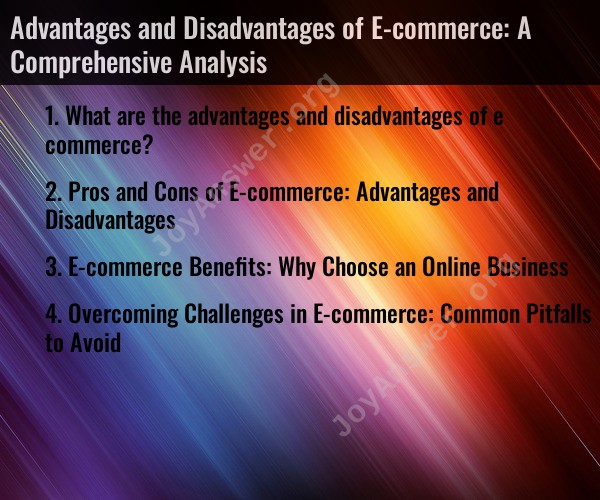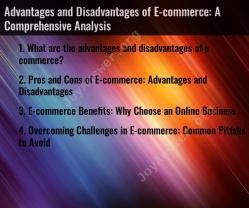What are the advantages and disadvantages of e commerce?
E-commerce, or electronic commerce, has transformed the way businesses operate and how consumers shop. It offers a range of advantages and disadvantages, both for businesses and consumers. Here's a comprehensive analysis of the pros and cons of e-commerce:
Advantages of E-commerce:
Global Reach: E-commerce enables businesses to reach a global audience. They can access customers beyond geographical boundaries, increasing market potential.
24/7 Accessibility: Online stores are open 24/7, providing customers with the convenience to shop at any time, day or night.
Reduced Operational Costs: Operating an e-commerce store often involves lower overhead costs compared to traditional brick-and-mortar businesses, which require physical space and staff.
Cost-Effective Marketing: Online marketing can be more cost-effective than traditional advertising methods, and it offers targeted marketing to specific customer segments.
Convenience and Accessibility: E-commerce provides consumers with convenience and accessibility, allowing them to shop from the comfort of their homes and access a vast range of products.
Wider Product Selection: Online stores can offer a wider variety of products, and customers can easily compare prices and features before making a purchase.
Personalization: E-commerce platforms can use customer data to personalize the shopping experience, recommend products, and provide tailored offers.
Customer Reviews and Ratings: Shoppers can read reviews and ratings from other customers, helping them make informed purchase decisions.
Efficient Inventory Management: E-commerce systems can manage inventory more efficiently, reducing the risk of overstocking or understocking.
Scalability: Businesses can scale their operations more easily in response to increased demand without significant physical infrastructure changes.
Data and Analytics: E-commerce provides valuable data and analytics that help businesses understand customer behavior, preferences, and trends.
Disadvantages of E-commerce:
Lack of Physical Interaction: E-commerce lacks the physical interaction and sensory experience that some consumers prefer when shopping.
Security Concerns: Online transactions involve sensitive data, raising concerns about security breaches and fraud.
Shipping and Delivery Issues: Delays, damaged goods, and logistical issues can lead to customer dissatisfaction.
Competition: The online marketplace is highly competitive, making it challenging for new businesses to gain visibility and market share.
Technical Challenges: Maintaining and updating e-commerce platforms require technical expertise, which can be a disadvantage for some businesses.
Return and Refund Complexities: Handling returns and refunds in e-commerce can be more complex compared to physical stores, leading to customer disputes.
Depersonalization: Some customers may find e-commerce experiences to be less personal compared to in-store shopping.
Overhead Costs: While operational costs can be lower, businesses may still have significant overhead costs related to technology, marketing, and security.
Digital Divide: Not all consumers have equal access to the internet or the ability to shop online, creating a digital divide.
Quality Concerns: Customers cannot physically inspect products, leading to concerns about product quality, especially with goods like clothing or electronics.
Ethical and Privacy Concerns: E-commerce raises questions about data privacy and the ethics of how customer data is collected and used.
In summary, e-commerce offers numerous advantages, including global reach, reduced costs, and convenience. However, it also presents challenges, such as security concerns, competition, and potential impersonalization. The specific advantages and disadvantages can vary depending on the type of business and its target market. Successful e-commerce businesses often find ways to maximize the advantages while addressing or minimizing the disadvantages.
Pros and Cons of E-commerce: Advantages and Disadvantages
E-commerce is the buying and selling of goods or services online. It has become increasingly popular in recent years, as more and more people have access to the internet and smartphones. There are a number of advantages and disadvantages to e-commerce.
Advantages of e-commerce:
- Convenience: E-commerce is very convenient for consumers. They can shop from the comfort of their own homes, 24 hours a day, 7 days a week.
- Variety: E-commerce offers a wider variety of products and services than traditional brick-and-mortar stores. Consumers can find products from all over the world with just a few clicks.
- Price: E-commerce businesses can often offer lower prices than traditional brick-and-mortar stores, as they have lower overhead costs.
- Information: E-commerce businesses can provide consumers with more information about their products and services than traditional brick-and-mortar stores. Consumers can read product reviews, compare prices, and learn about the latest products and services on the market.
- Global reach: E-commerce businesses can reach a global audience with their products and services.
Disadvantages of e-commerce:
- Shipping costs: Shipping costs can be a disadvantage of e-commerce, especially for consumers who live in rural areas or who order large or heavy items.
- Security: Security is a concern for some consumers when shopping online. There is always the risk of identity theft or credit card fraud.
- Customer service: It can be difficult to get customer service from an e-commerce business, especially if the business is located in another country.
- Returns: It can be difficult to return items purchased online, especially if the items are damaged or defective.
- Impulse purchases: E-commerce can make it easy for consumers to make impulse purchases, which can lead to overspending.
E-commerce Benefits: Why Choose an Online Business
There are a number of benefits to choosing an online business over a traditional brick-and-mortar business.
- Lower startup costs: It is generally less expensive to start an online business than a traditional brick-and-mortar business. E-commerce businesses do not need to invest in physical space, inventory, or staff.
- Global reach: E-commerce businesses can reach a global audience with their products and services.
- 24/7 operation: E-commerce businesses can operate 24 hours a day, 7 days a week.
- Easier to track customer behavior: E-commerce businesses can track customer behavior more easily than traditional brick-and-mortar businesses. This information can be used to improve marketing and sales strategies.
- More flexibility: E-commerce businesses offer more flexibility to owners and employees. Owners can work from anywhere in the world, and employees can often work from home.
Overcoming Challenges in E-commerce: Common Pitfalls to Avoid
There are a number of challenges that e-commerce businesses face. Some of the most common challenges include:
- Competition: There is a lot of competition in the e-commerce space. Businesses need to find ways to differentiate themselves from their competitors.
- Customer acquisition: It can be difficult to acquire new customers for an e-commerce business. Businesses need to invest in marketing and advertising to reach potential customers.
- Customer retention: It is important for e-commerce businesses to retain their customers. This can be done by providing excellent customer service and offering a good customer experience.
- Fraud: E-commerce businesses are susceptible to fraud. Businesses need to implement security measures to protect themselves from fraud.
- Shipping: Shipping can be a challenge for e-commerce businesses. Businesses need to find reliable shipping partners and offer competitive shipping rates.
Despite the challenges, e-commerce can be a very rewarding business venture. E-commerce businesses can offer a number of advantages to consumers, including convenience, variety, price, and information. Businesses that can overcome the challenges of e-commerce can be very successful.










